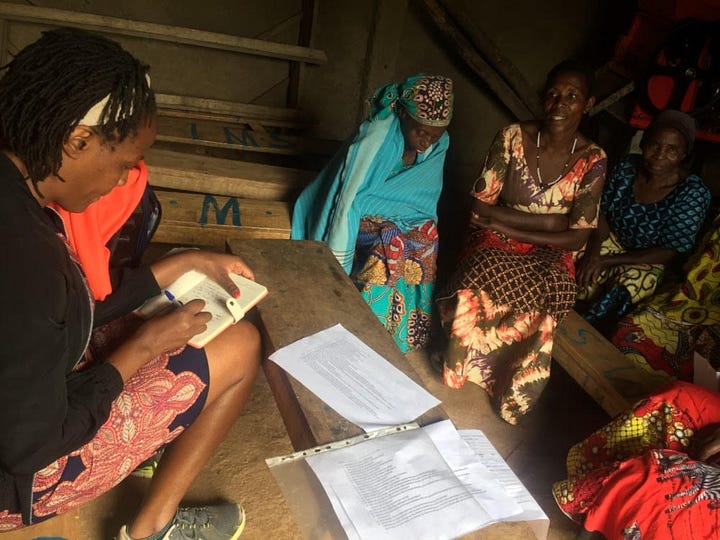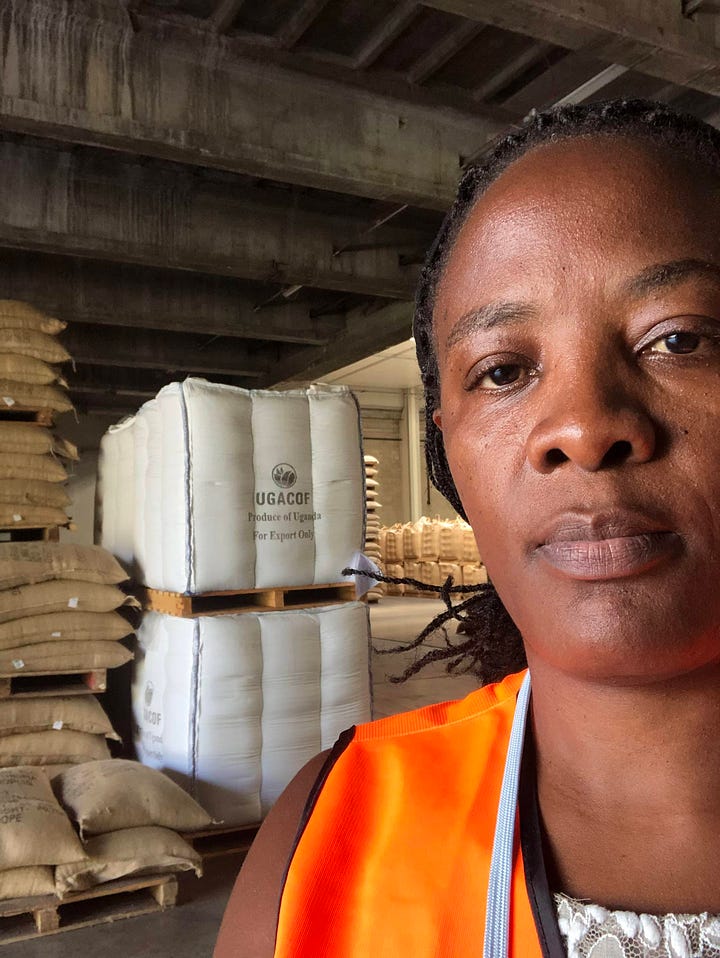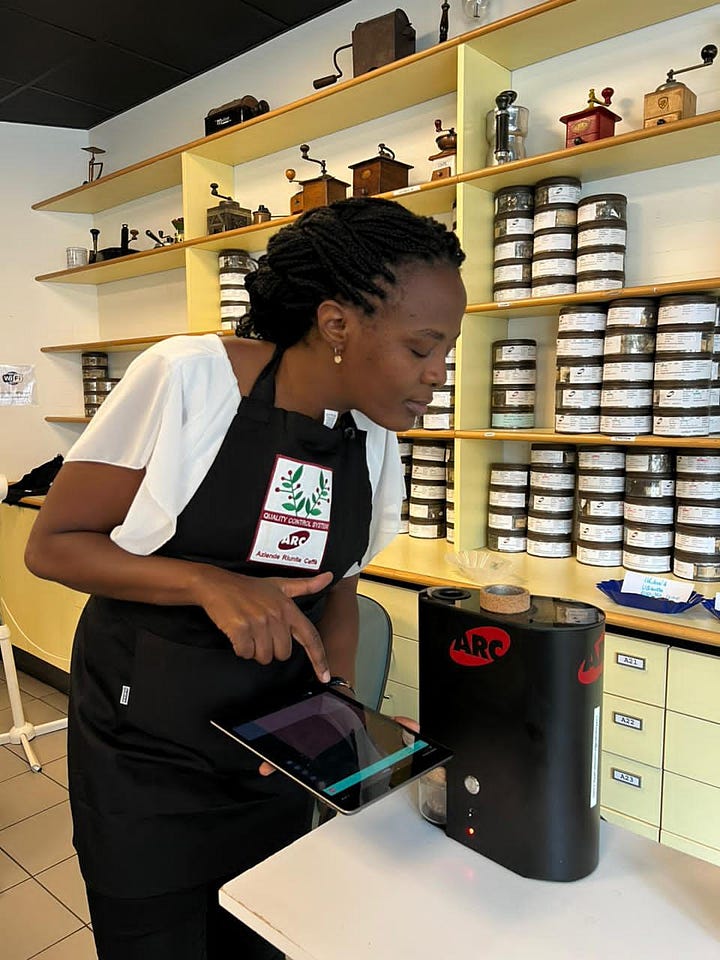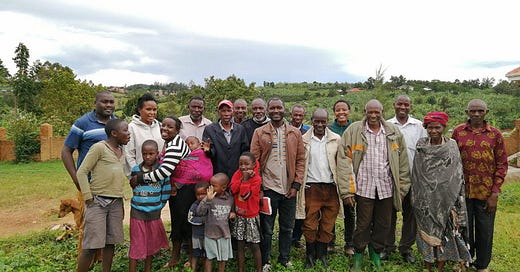"Coffee is as cross-cultural as it gets"
Meet the Ugandan coffee entrepreneur who's using strategic storytelling to bridge divides and mobilise her industry
Based in her home country of Uganda,
is an independent consultant specialising in the coffee industry, helping non-profits and businesses. She also sources and sells both green and roasted coffee, locally and for export.Her newsletter
was one of the first Substacks I subscribed to. Susanna doesn’t post on Substack very often, but when she does, you can expect a unique perspective on the human relationships that underpin the machinations of an international industry. Her posts are rich in story-telling and pay close attention to social intricacies – in settings as diverse as Dublin, Milan and Kampala.In today’s conversation, Susanna opens up about…
The role of story-telling in bridging cultural divides.
Having a balanced approach towards ‘Fair Trade’ thinking.
How the emerging generation of Ugandan coffee farmers see the world differently.
… and more!
So if you’re intrigued by the intersection of business, cultural heritage, coffee and online storytelling, this is for you.
Theo: Thanks for doing this Susanna! I’m intrigued by the way your writing combines big-picture thinking with quite intricate, face-to-face interactions. What kind of problems are you solving in your daily work?
Susanna: Sometimes the problems are basic, such as trying to find ways for farmers in remote regions to access the technology to join Zoom meetings.
Sometimes my work is more strategic and relationship-building. So on a call recently, I was making a case for a partnership with a friend. With his abilities in marketing and generally ‘making things happen’, he was the best partner for a project which would involve pitching a Ugandan merchandising brand with the idea of roasted coffee trading under their own brand. (This would target Ugandans mainly, because Ugandans are not drinking enough coffee.)


I might also be contributing solutions to issues that are too large for me to solve on my own. So in another recent conversation I was discussing a document that we are preparing with a friend, in response to a call for proposal by an international organisation working in coffee. His firm has the experience to carry out a baseline survey in two of the coffee-growing regions in Uganda. What they haven’t got is a coffee person to inform some of their methodology. Which is where I came in.
“I might be contributing solutions to issues that are too large for me to solve on my own.”
And sometimes I’m helping to ensure funding for worthy initiatives. For example, I was requested to join a Zoom call to narrate some of the real ways in which the work that is going on is impacting the lives of the community, and the goal was to establish whether a funding partnership would be extended. With participants listening in from three continents, it is the type of conversation in which my exposure (in some way) to all three continents made me a good fit to ‘read the room’ and communicate helpfully.
Theo: How do you see the role of storytelling in this kind of work?
Susanna: Storytelling has the power to communicate experiences and concepts in a way that nothing else can. Nuances can be described without struggling with the limited vocabulary that will sometimes happen, particularly in cross-cultural situations.
Coffee is as cross cultural as it gets. Farmed in one part of the world, consumed in another – you’ve got to find a way to bridge gaps in communication. I see this as one of my primary roles in most of the work that I do.
Theo: Did studying coffee in Italy change how you think about Uganda’s coffee heritage? Coffee doesn’t originate in Italy, after all…
Susanna: There’s a Luganda saying (and I’ve heard variations of it in other cultures) that simply translated says: it is only he that has not moved about much that believes their mother’s cooking is best.
One of the most enriching experiences from my Masters course was the opportunity to interact with ‘coffee people’ from different parts of the world. Producers from other countries in Africa, Asia, and Latin America as well as coffee professionals from Europe. If I remember correctly, there were 16 countries represented on the course. To hear other people’s pride in their country’s coffee challenged me to think, perhaps for the first time, about Uganda’s coffee industry and our place in the global coffee world. What we bring in terms of comparative quality, trade practices, coffee culture, and so on.
The Masters in Coffee Economics and Science course at the University of Trieste was hybrid, so a lot of it was done online whilst I sat in Kampala. The time spent in Italy doing the practical courses was intriguing in that I was able to experience a country with such a long and strong coffee culture, with this product that they do not grow but only buy from the coffee growing world.
Theo: You must have gained insights into the different motives of people at all levels of the industry. What kind of cross-cultural misunderstandings crop up?
Susanna: When I told my father that I was going to spend some time in Italy learning about coffee, he said: Just give me that money and I’ll teach you everything you need to know about it. He says coffee is the one crop that he knows ‘through and through’ having come from a coffee growing family.
Many families in Uganda (my father’s included) have a long history with coffee growing and trace their involvement back to colonial times. Because of this history, there is a sense amongst many Ugandans that ‘we know coffee’. This is true, to an extent and is an advantage because it has proven easy for coffee promotion campaigns when communities are mobilised to grow more coffee, or even to make some improvements in coffee processing practices.
However, even good agricultural practices evolve over time as interactions happen across borders, as markets demand better products, and as technological advances occur.
“Many families in Uganda (my father’s included) have a long history with coffee growing and trace their involvement back to colonial times.”
Illycafe, which is a family-owned business, is one of the sponsors of the course, and we had the opportunity to study their history and the different ways that they have innovated. It was also a chance to see coffee from the perspective of the consumers and business people. Having been introduced to the industry through the non-profit sector, I’d primarily seen it from the ‘Fair Trade arguments’ side of things. Perspectives from the business side of things helps one understand that for every decision made towards sustainability for instance, a cost/revenue/profit conversation has to happen as well. This gave me a better understanding of the kind of considerations that are being weighed up daily, as business people make decisions on how their green coffee is sourced, for instance.


So, everywhere there were parallels to be drawn around how the same industry has affected families on different continents. But also questions about the benefit gained from it – attitudes towards equity, fairness, and sustainability, and ultimately how we are all seeing our futures in coffee; as business people, and as nations.
Theo: Tell me about the contrast between Uganda’s coffee farms and Milan’s coffee culture.
Susanna: Several times whilst in Italy, moving around beautifully designed cafes, seeing sleek coffee brewing machines and the high-tech Illycafe labs, I had the sense that in some ways this was the ‘glam’ side of coffee. Away from the dirt and sweat of coffee cultivation.
However, on completing the course, I was also given the opportunity to do a work placement for a month with a Milanese coffee trading house that has been in business since 1856. Hearing about the business and some of the struggles many coffee traders had been through in recent years, particularly during Covid, got me thinking that perhaps glam was not all it was on the buyers’ side, either.
Many of the smaller businesses had closed or come to the brink of closure, and with every change in the dynamics of the industry, many are still struggling.
Theo: What inspired you to start writing on Substack, and particularly your focus on the human stories behind coffee?
Susanna: Over one billion cups of coffee are consumed every single day. Most people who drink coffee, drink it daily. More than 100 million people farm coffee. It is difficult to say exactly how many people work in the industry in some capacity but there are hundreds of millions.


This means that when coffee is mentioned, there are potentially billions of people whose interest would range from mild to eager. I also realised that it didn’t matter what local or global conversation was happening around me, there was something to be said, or understood about it from the perspective of the coffee industry.
My newsletter ‘Caffeinated’ is written from my own perspective living and working in Uganda. As someone who was experiencing many of these issues for the first time, I thought that writing about them would not only deepen my understanding but may also give readers some insight into how people I interact with interpret and absorb different events as they happen.
Theo: What kind of impactful events do you have in mind?
Susanna: For example, the European Union recently came up with a new rule about deforestation in coffee growing areas. A friend owns a eucalyptus forest that he started planting back when we were at university. It is now mature enough to cut and sell the trees as timber for building material. This friend told me of his plans to grow coffee on the same land when the forest was cut down. My immediate response was to ask whether he had considered that perhaps he would now not be able to sell his coffee to Europe.
This is the kind of conversation that would be ideal for Substack, because of the global nature of the platform but also the platform’s ability to handle ‘high level’ issues such as economics and sustainability, as well as the simple chronicling of personal experiences.
Theo: (Yes, my hope for Substack is that it can help fill the void left by the decline in local newspapers.) What could the world learn from Uganda’s coffee farmers?
Susanna: Let me speak specifically about the emerging coffee farmer – who is younger, more business savvy, and better informed about world events. They are not going to settle for what our parents and grandparents made from coffee. They want the world. They are more innovative, wanting to get into more profitable markets. I’m excited about this new wave.
They are not going to settle for what our parents and grandparents made from coffee. They want the world.
No one wants to settle for business as usual, where some parts of the market are taking a greater share of profits. Farmers are keen to figure out ways to retain as much of the share of the profits as they can.
Theo: Finally… what question would you like to be asked, and why?
You haven’t asked me how I like my coffee.
I’m guessing that as most of your readers are not living in coffee producing countries, their relationship to coffee is mostly in the drinking of it. It is a question they ask, or answer frequently.
In my own country, Uganda, only 4% of the coffee we produce is consumed in-country. The rest is exported. So few Ugandans are asking each other how they like their coffee.
My Answer: Black, no sugar.
Theo: Me too! Thank you Susanna.
Thanks for reading. Can I direct you now towards Susanna’s latest Substack post?👇
If this contributed something positive to your day, here’s how you can send a tiny tip without committing to an annual subscription. For anyone who gives, thank you, thank you, thank you. 🙏






Beautiful
I didn't know that it's possible to go and study about coffee like you would study a bachelors degree
Interesting read, wow Susanna